RecoveryFox AI Test – Can The AI-Powered Data Recovery Tool Take the Hassle out of the Process?
While much of our data now gets backed up on the cloud, backups are only half the data recovery war. Timely recovery is just as much important. While data recovery is still more of a dark art than an exact science, the AI-powered recovery tool takes the guesswork out of data backup and recovery and aims to improve our decision-making in a few simple steps.
You scan a drive, it detects data that you might want to recover, and you command it to do it for you. RecoveryFox AI keeps is fairly simple. But what the “AI” in its name has to do with data recovery? I have tried and tested the software to find the answer.
Pros&cons
RecoveryFox AI – Pros and Cons
My personal experience
RecoveryFox AI – What Was My First Impression Like?
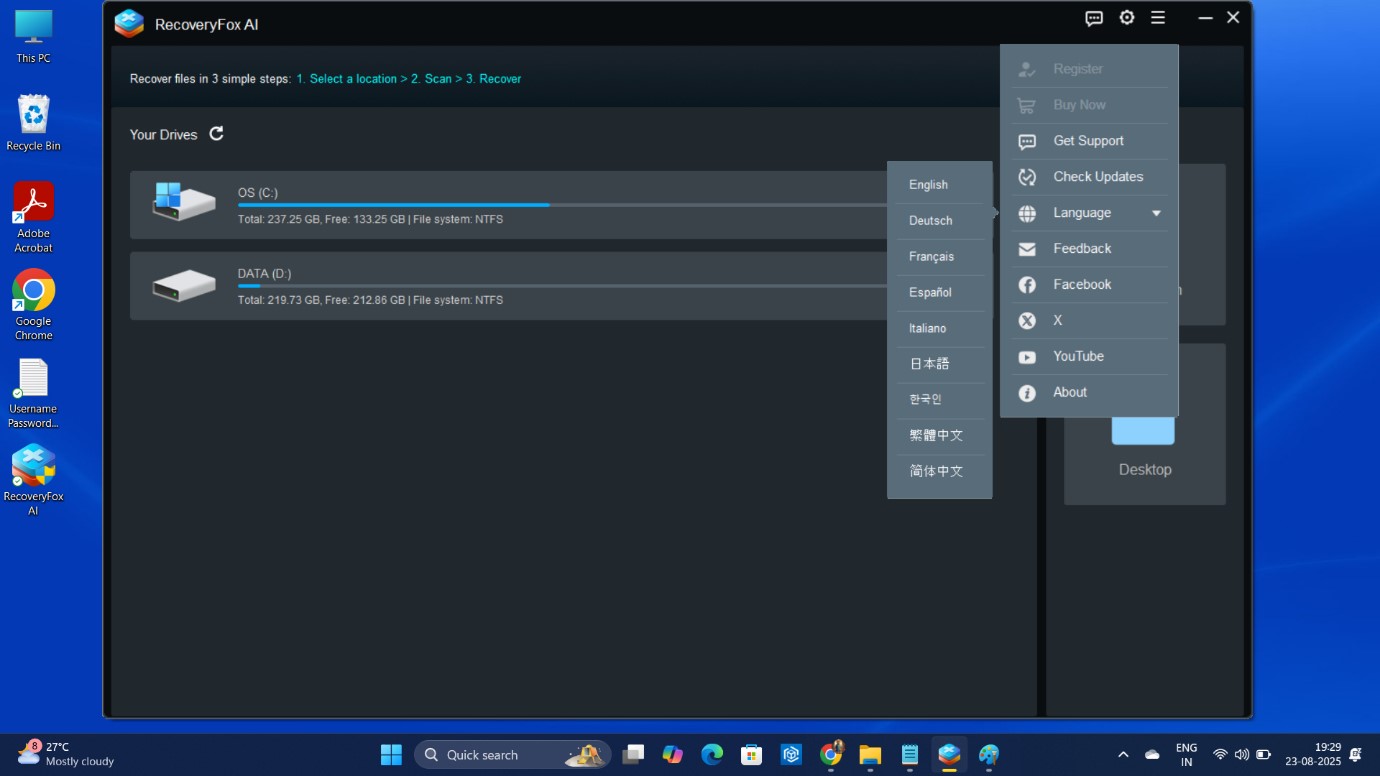
When I tested RecoveryFox AI, the first thing that stood out was its preview window. Before committing to any recovery, I could actually check what files were recoverable—videos, photos, documents, and even web files.
That gave me peace of mind because I wasn’t blindly pulling everything back.
The tool claims a 98% recovery rate, and while it obviously can’t replicate that exact figure across every situation, the success rate impressed me.
While using it, I managed to bring back a mix of photos and work files quickly and without much hassle.
I also appreciate the fact that it doesn’t just dump everything into one folder. With a single click, it restores files in their original folder structure.
That small touch makes a big difference when you’re trying to sort through years of work or personal data. I will get to the finer details of how I put it to test in a bit.
The software application is compatible with different file systems like NTFS, exFAT, and FAT32. It supports and handles a wide range of file types, from PDFs to ZIP archives.
I tried running it on different devices, and it didn’t fail to impress me. It recognized data from HDDs, SSDs, USB drives, SD cards, and even a camera card I had lying around.
The search and filtering function takes the hassle out of data recovery. You can filter files by type, date, or size, or even search by filename or extension.
Comparison with competitors
RecoveryFox AI vs Disk Drill vs TestDisk – Features Comparison
| Feature | RecoveryFox AI | Disk Drill (CleverFiles) | TestDisk (CGSecurity) |
| Supported devices | HDD/SSD, USB, SD/TF cards; Desktop & Recycle Bin cases | Windows recovery from internal/external drives, USB, SD/CF cards, cameras, SSDs, virtual disks, RAID, disk images | Cross-platform partition and file recovery; works on many filesystems (FAT/exFAT/NTFS/ext2/3/4, APFS, HFS+, XFS, etc.) |
| Deep scan mode | |||
| Damaged or newly formatted disk recovery | |||
| Data collection | No data collected | Some data is collected | Open-source, portable executables; runs locally without installer or account |
| Free version or trial availability | Unregistered version available with very limited features | Free edition; recovers up to 100 MB on Windows | Free and open-source (GPL) |
Recovery test
Did It Pass the Test?
I wanted to check whether RecoveryFox AI really does the job as it promises. So, I emptied my Recycle Bin after deleting an image file from my hard drive.
Then, I opened the application, ran a search and further filtered my search by file type. It was a .png file I was trying to recover.
It didn’t exist anywhere on my computer. I found that RecoveryFox AI found the deleted file within a few seconds.
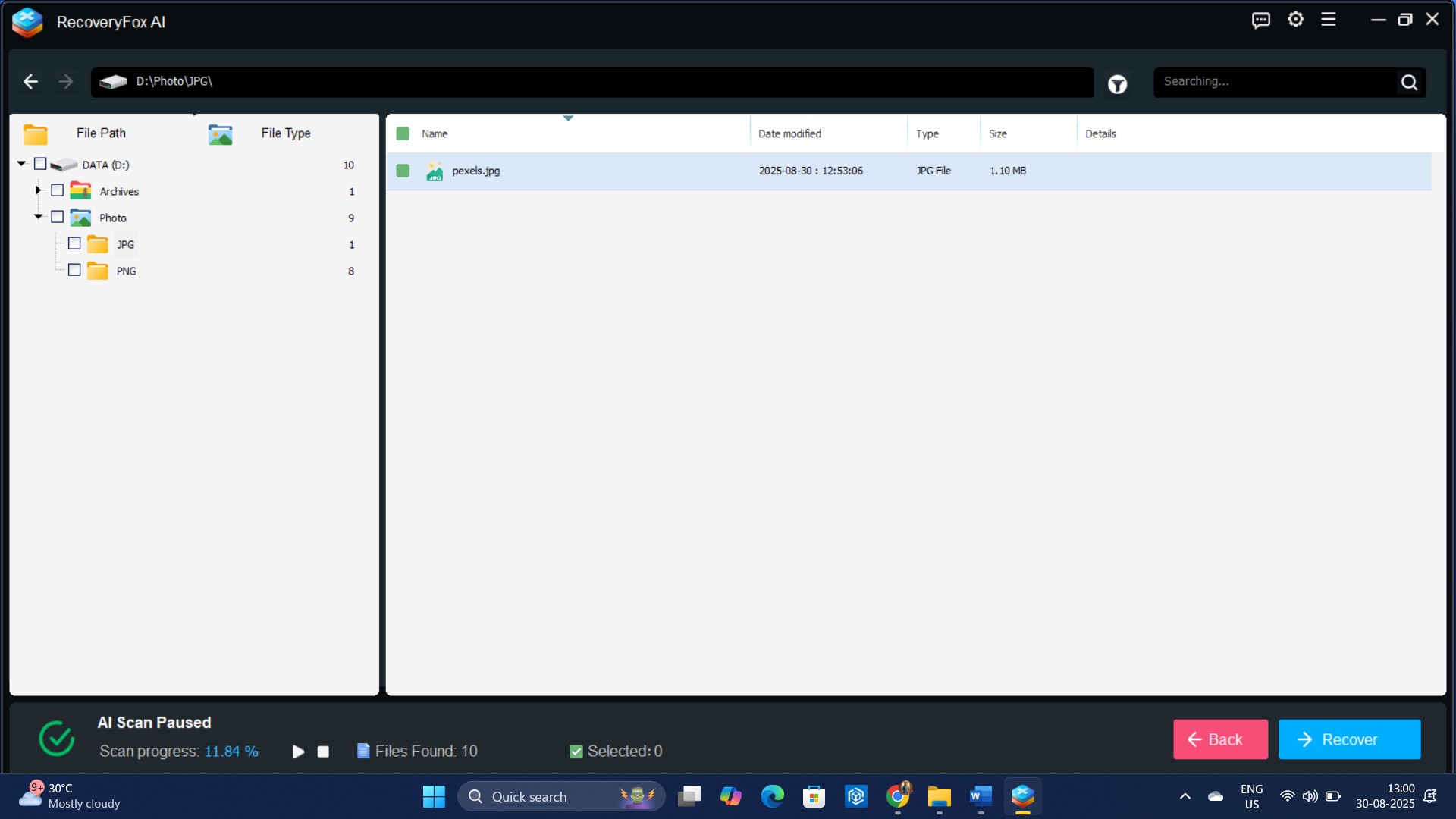
I selected the file and attempted to recover it. The application asked me to select a location on my hard drive and I chose one.
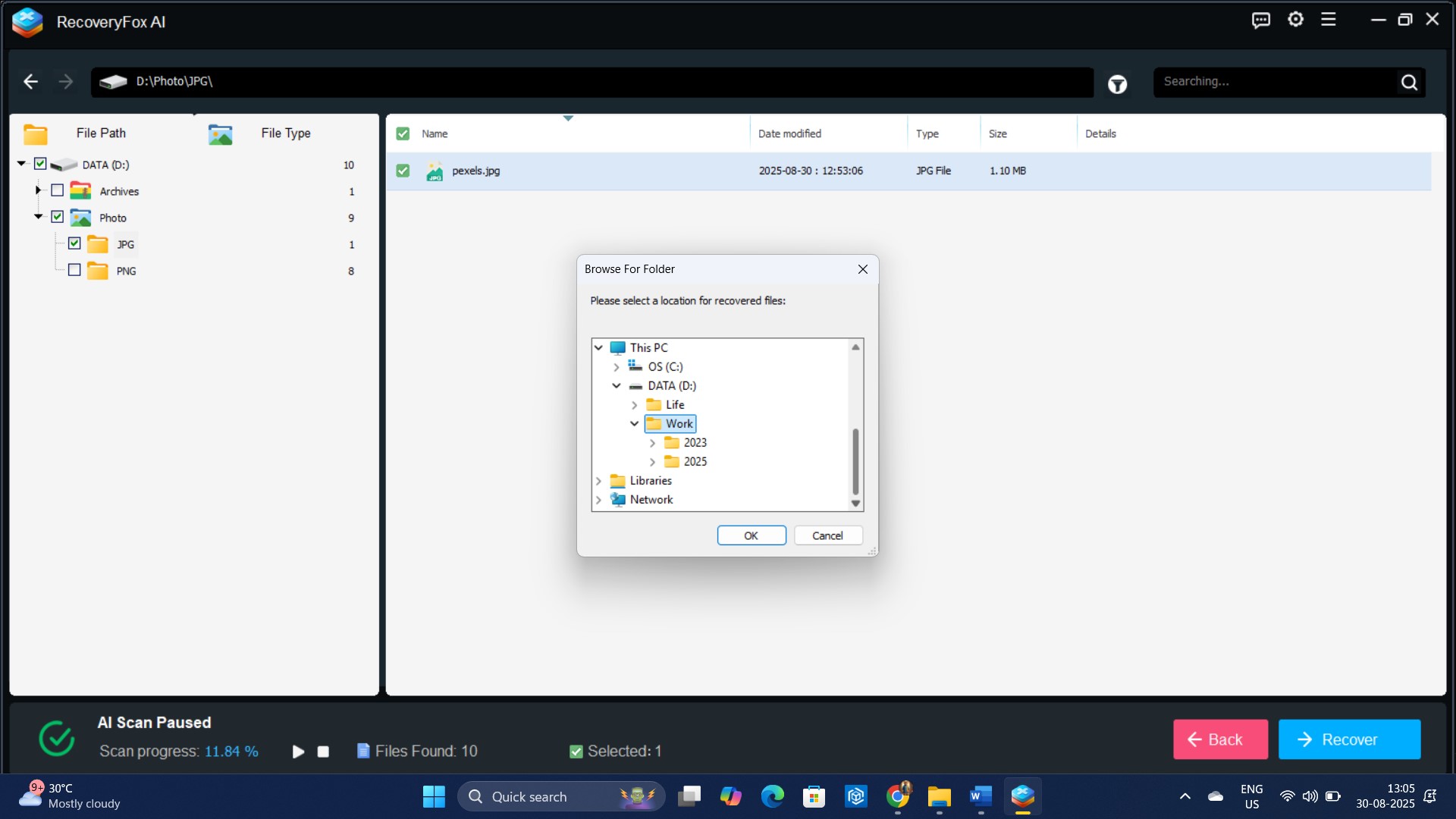
It took the application less than five seconds to recover the media file I intentionally deleted and kept no trace of.
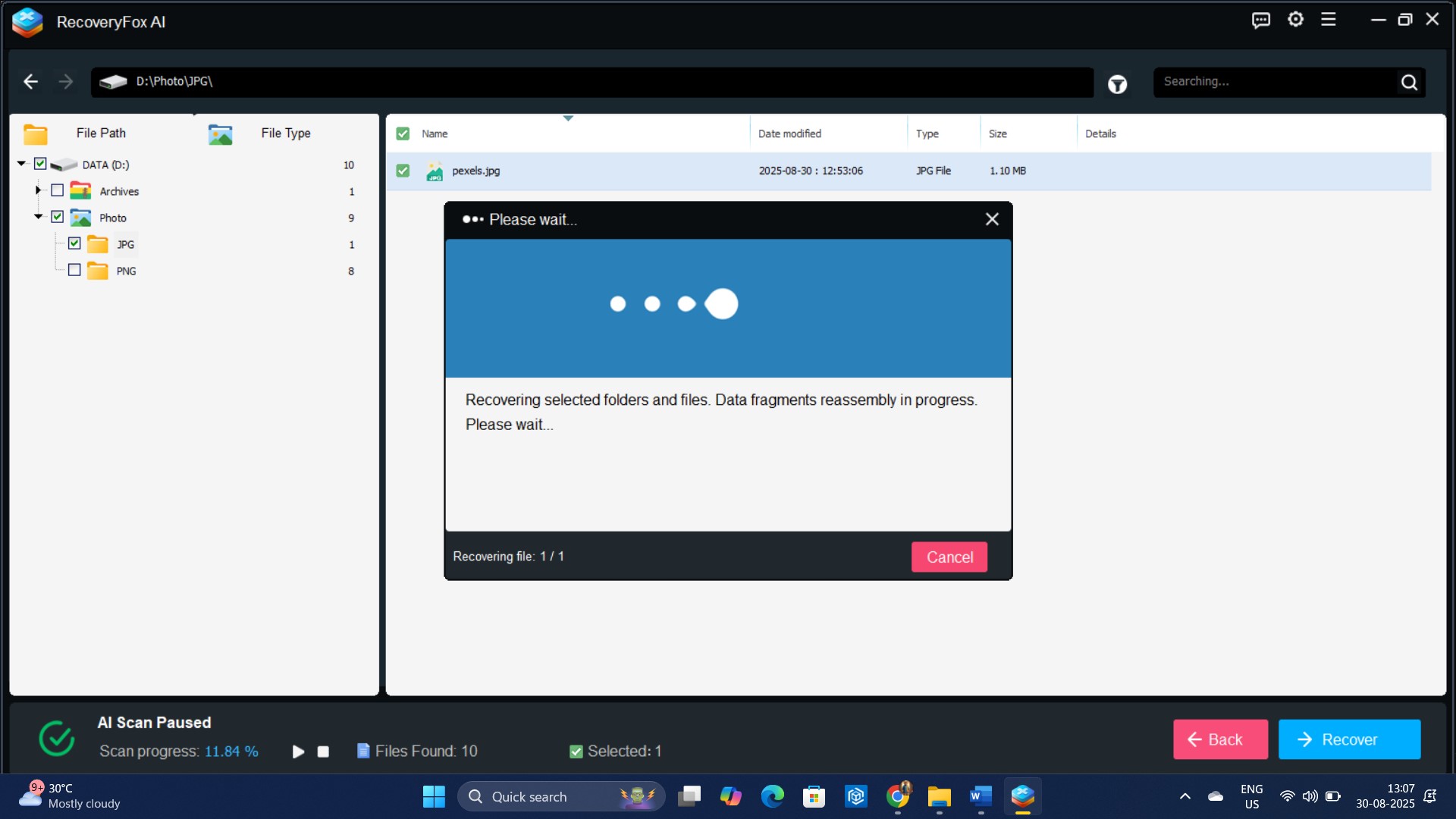
The rest was a no-brainer. The application asked me to open the folder location to see if the media file was perfectly restored. I eventually found that it neatly completed the task.
Search trends and popularity
Is RecoveryFox AI Gaining Popularity Online?
I checked Google Trends for RecoveryFox AI worldwide search trends over the past 12 months. Here’s what I found.
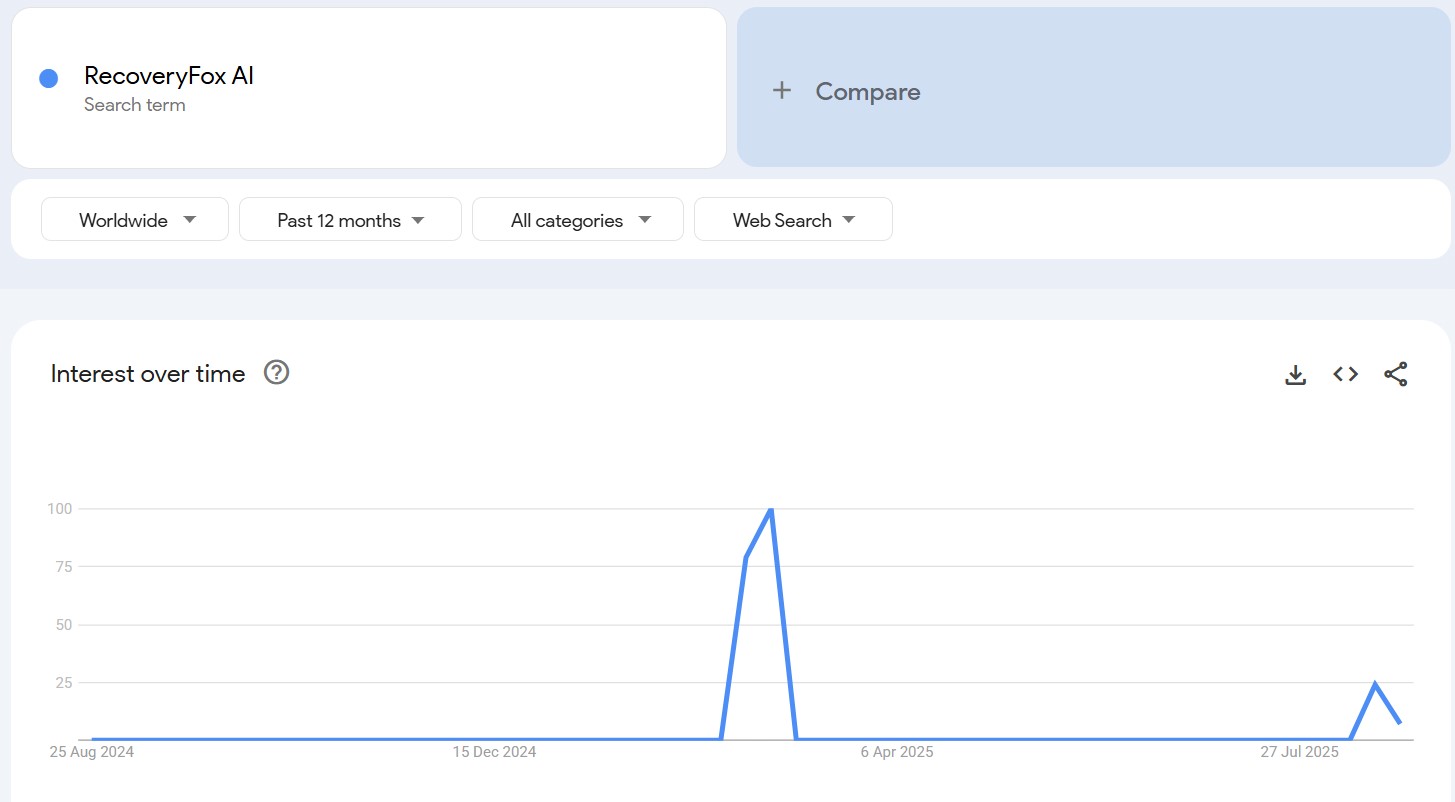
As you can see, most weeks over the past 12 months barely register, then the line jumps: a big spike in early April 2025 reaching peak interest, and a smaller bump in late July.
This pattern suggest that the occasional search interest growth is likely tied to a release, promo, or news mention, rather than steady, everyday searches.
It also suggests that it is an emerging software product that has started to break through but hasn’t settled into a constant baseline yet.
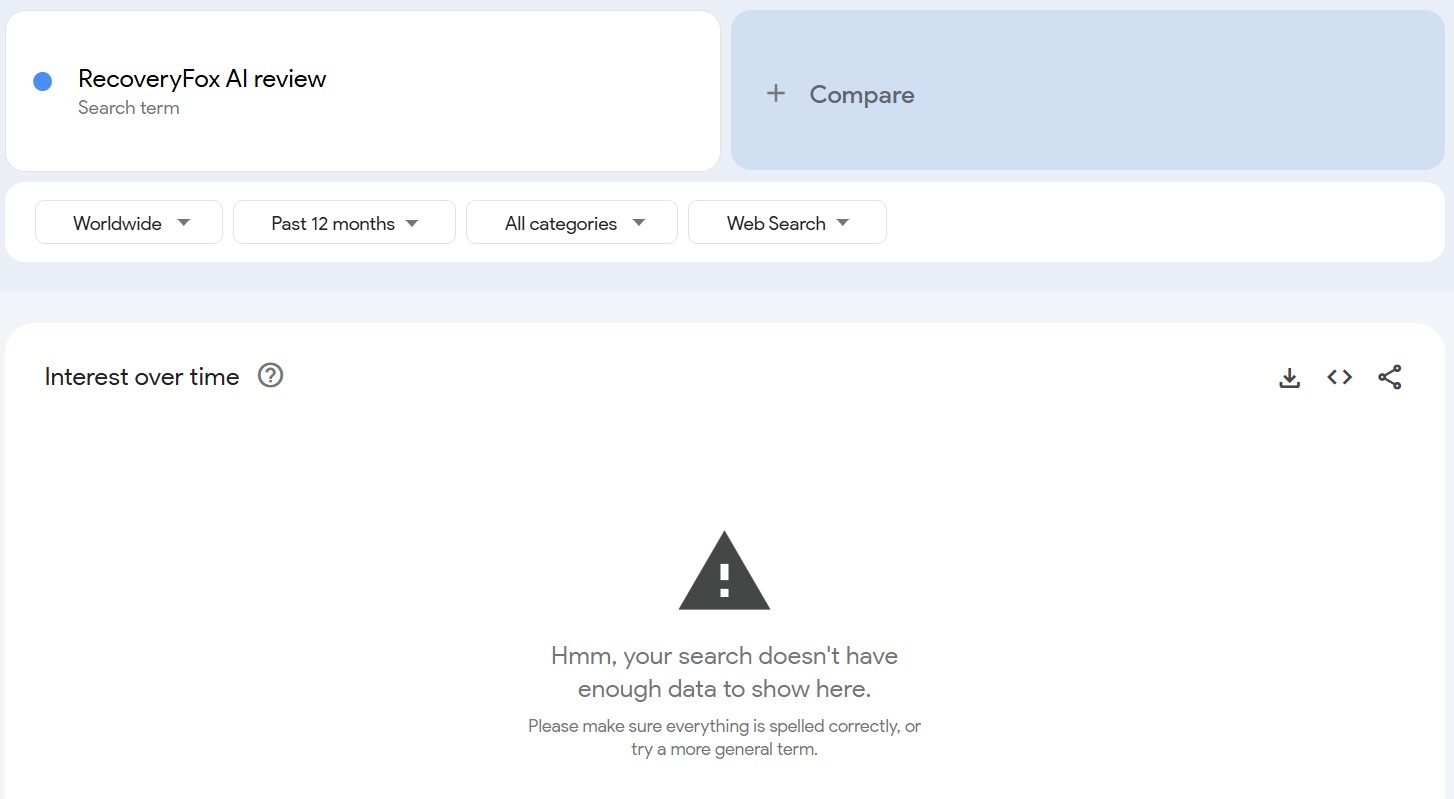
I also tried queries like “RecoveryFox AI review” and “Buy RecoveryFox AI,” which didn’t return chartable data.
A few words about AI
RecoveryFox AI – Is the AI in Its Name a Gimmick?
Frankly speaking, when I first saw the name RecoveryFox AI, I couldn’t help but wonder: does the “AI” actually mean something here, or is it just another marketing label? After all, plenty of tools toss those two letters around without much substance. In this case, though, the intelligence isn’t smoke and mirrors, as it turned out.
RecoveryFox AI restores deleted data, even from a long time ago, using advanced artificial intelligence algorithms that deeply scan storage devices to find and reconstruct lost or deleted files. It works primarily by performing two types of scans: a Quick Scan to recover recently deleted files with original names and folder structure, and an AI-powered Deep Scan that searches for file signatures and fragments to locate older or more fragmented data. This AI Deep Scan can rebuild files even if they have been partially overwritten or the file system is damaged.
The scenarios it covers are the usual suspects: emptied Recycle Bins, Shift+Delete accidents, formatted USB sticks, malware-related losses, system crashes, even blue-screen wipeouts. I tried restoring media files, as you know by now, and the application worked so quickly and effectively that I didn’t feel the “AI” label was a stretch.
Conclusion
Does It have the Potential?
So, is the intelligence in RecoveryFox AI revolutionary? Not quite. There are data recovery tools that are increasingly using the power of AI.
However, what it does is add flexibility, foresight, and adaptability to a process that’s often stressful and rigid. Since the interface is easy to navigate, it makes recovery feel like a smooth glide.
Overall, my experience with RecoveryFox AI was pleasant, to say the least. It’s a straightforward and reliable tool that I would personally recommend for personal data recovery.
It doesn’t overcomplicate what should already be a stressful situation, and that’s its biggest plus as I feel.





